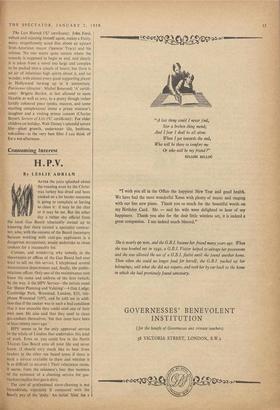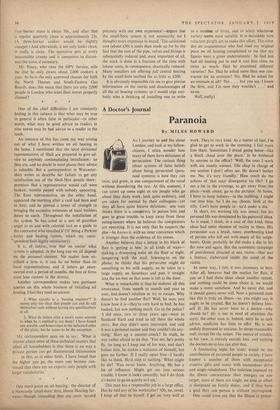Consuming Interest
H P.V.
By LESLIE ADRIAN Curious, and wondering why nobody in the showrooms or offices of the Gas Board had ever tried to sell me this service, I telephoned several maintenance departments and, finally, the public- relations officer. Only one of the maintenance men knew the name and address of the firm (which, by the way, is the HPV Service—the initials stand for 'Home Planning and Valeting'-4 Oak Lodge, Cambridge Park, Wanstead, London, El 1, tele- phone Wanstead 3197), and 'he told me in addi- tion that if the cooker was in such a bad condition that it was unusable they could send one of their own men. He also said that they used to clean gas-cookers themselves, 'but that must have been at least twenty years ago.'.
HPV seems to, be the only approved service in the whole of London that undertakes this kind of work. Even so, you could live in the North Thames Gas Board area all your life and never know. (1 should very much like to hear from readers in the other ten board areas if there is such a service available to them and whether it is as difficult to uncover.) Their reluctance stems, it seems, from the salesmen's fear that mention of the existence of a cleaning service for gas- cookers implies that gas is dirty.
The cost of professional stove-cleaning is not immoderate, especially if compared with the hourly pay of the 'daily.' An initial 'blitz' for a
four-burner stove is about 30s., and after that a regular quarterly clean is approximately 23s. (A three-burner cooker would be slightly cheaper.) And afterwards, it not only looks clean, it really is clean. The operative gets at every inaccessible cranny and is competent to discon- nect the stove, if necessary.
Mr. Pusey, who runs the HPV Service, tells me that he only cleans about 2,000 cookers a year. As he is the only approved cleaner for both the North Thames and South-Eastern Gas Boards, does this mean that there are only 2,000 people in London who want their stoves properly cleaned?
One of the chief difficulties I am constantly finding in this column is that what may be true in general is often false in particular—in other words, what may be good advice to readers in nine towns may be bad advice to a reader in the tenth.
An instance of this has come my way arising out of what I have written on oil heating in the home. I mentioned that the local divisional representatives of Shell are prepared to give ad- vice to anybody contemplating installation : so they are, and no doubt in most places their advice is valuable. But a correspondent in Worcester- shire writes to describe her failure to get any satisfaction out of the Shell-Mex people there : promises that a representative would call were broken; months passed with nobody appearing. The Esso representative, on the other hand, appeared the morning after a card had been sent to him; and he proved a tower of strength in bringing the excessive estimates of local builders down to earth. Throughout the installation of the system 'he has acted as a sort of guardian , angel to us and with celestial tact as a guide to the contractor who installed it' ('it' being a Perkins 1 boiler and heating system, which my corre- spondent find's highly satisfactory).
It is, of 'Course, true that no matter what system is adopted, in the long run we ,all depend on the personal eleinent. No matter how ex- cellent a firm is, it can be no better than its local representatives; and if letters go unan- swered over a period of months, the best of firms must lose custom in the district.
Another correspondent makes two pertinent queries on this whole business of installing oil heating. I feel they need no answer.
1. What exactly is a 'heating engineer'? It seems only too clear that people can and do call themselves such without having any qualifications at all 2. What do letters after a man's name amount to when he is entitled to use them? I have found one sensible and honest man in the unheated cities of the plain; but he seems to be the exception.
My correspondent goes on to say : 'What is sinister about some of these technical matters that affect all householders is that there is no way a private person can get disinterested information . . in this, as in other fields, I have found that the higher you go, the more you become con- vinced that there arc no experts, only people with larger vocabularies.'
* * * One more point on oil heating: the director of a Newcastle 'small-bore' firm, Home Heating Ser- vices—though conceding that my costs 'accord precisely with our own experience'—argues that the small-bore system is not necessarily (as I thought) more expensive to install. 'The additional cost (about £30) is more than made up for by the fact that the cost of the pipe, valves and fittings is substantially reduced and, most important of all, the work is done in a fraction of the time with labour costs, in consequence, drastically reduced. Many installers are offering full central heating by the small-bore method for as little as £200.'
It is obviously impossible for me to give precise information on the merits and disadvantages of all the oil heating systems; so I would urge any- body who is thinking of installing one to write to a number of firms, and to select whichever variety seems most suitable. It is incredible how reluctant people are to make this effort. The other day an acquaintance who had read my original piece on oil heating complained to me that my figures were a gross underestimate : he had just had oil heating put in and it cost him close on twice as much. Had he examined different varieties? No. Had he asked more than one con- tractor for an estimate? No. Had he asked for an estimate at all? 'No . . . but you see, I know the firm, and I'm sure they wouldn't . . .' and so on.
Well, really!











































 Previous page
Previous page